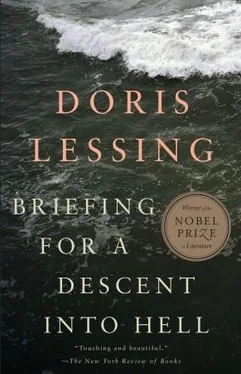I was watching this man for some reason, and thinking that as I stood still I was getting cold. This was my strongest thought — that I was cold. At the same time I thought that I knew this man. All at once there welled up in me a strong feeling of knowledge of him — no, not just friendship, and remember that I am sixty years old, and not a romantic girl. I can’t say more than this: I can’t remember a time when I’ve felt so powerful a kinship with someone, as if I really knew someone through and through, and was linked deeply with him. As this feeling faded, leaving me rather astonished and even amused at it, I realised that of course I knew him: it was Frederick Larson. Perhaps you know the name? No, he is not a well-known person, but I do not think it is really a foolish question. For one thing, how often does one say to a friend or acquaintance about another, Do you know so and so, and he does — improbably. But in this case there is more. It turns out that as we — I’ll explain the “we” in a moment, meet each other, and attract others, in fact we are already in the same orbit, if I can put it like that. We know each other, or have friends in common. The actual meeting is only a confirmation of an existing link. Anyway — Frederick knows your name, and your work, and he says that in fact he met you once, but there were people there — another lecture, it is doubtful you will remember, if you ever heard, his name.
When he came up to the gate and saw me standing there he said smiling: “And now tell me about yourself.”
I’ll explain. It is an old joke. It was twenty-five years ago that I first heard of him through my sister Marjorie. She was with her husband in Greece. He was an archeologist. He got some form of blood disease, and was a long time ill before he died. During this time, Frederick Larson, who was an old friend of his, befriended him and Marjorie. He was an archeologist, too. He got long leave to be with his friend, my sister’s husband, while he died. My sister was lonely and miserable and wrote long letters to me, two or three times a week. She told me all about this marvellous friend of her dying husband’s, of this friend’s kindness and patience and lovingkindness, and so on. She told me all about him, his early life, his struggles, his education — everything. In short, I knew everything about him and he knew everything about me, because there seemed no particular reason why we should ever meet. We were to each other more like characters in a long-running serial story, but the story is being written as one reads. We knew the most intimate things about each other. It was not the first time — nor the last — that I have had this relationship with people I haven’t met. But now of course I wonder if this extraordinary intimacy at second hand means that one day we are bound to meet. Well, one day at a party I was next to an American I had never met, and yet who seemed familiar. I had not caught his name when introduced. And he felt the same about me. We started telling each other things we knew about each other, as a joke, withholding our names. We knew each other extremely well — we knew more about each other than many who meet every day of their lives. Well, at last we came out with our names, and all was explained. The beginning of a beautiful friendship? Not then, at any rate. He was just off to a dig in Turkey, I was to take one of my children for a holiday, our lives were in very different grooves. We joked that there was no point in our being friends, because we already knew everything there was to know, and there could be no surprises. After that we kept running into each other, in the street, at friends’ houses. Of course, he was often abroad, and when my children were half grown, we would take them travelling. Before we left on a trip I would jokingly make a bet with my husband that we would run into Frederick somewhere. We did, more than once. When we met, one or other would say: “And now tell me about yourself.” More often than not, we already knew — mutual friends had kept the serial story running.
This time, when he reached where I stood, he turned and looked in at the court — but it is too big to be called a court — where tiny people hurried away from the great building. He must have seen what I was seeing, because he said: “There are buildings as large as that one which have flights of steps to them in scale with their size.”
I didn’t understand.
“There’s a building in Peru for instance. It has stairways which could not be used by our size of human being. Imagine that building there with steps up to it in scale — steps the height of a man. The reason why that building dwarfs us so, is because of the proportions of the steps and the building itself. It is in the proportions.”
“But it would be a building for giants,” I said.
He quoted, laughing: “But there were giants in those days.”
I was getting very cold by now, and I was late for a visit I was making. As I thought this, he said, “Well, I expect we’ll run into each other again.”
I had already said good-bye and turned away when I had to return. It was like a panic, a warning, a sense of possibilities being lost, of vanishing opportunities. Into my mind had come the memory of your talking on that dreary platform. Frederick had also turned back after having walked away a few steps.
He said: “I spent last summer working on a site in Turkey. About half an acre of a city has been exposed. It must have been some miles across. It looks as if under the top level are many other levels. Human beings have lived on that site for many thousands of years. Probably the climate has changed in that time, changing everything, vegetation, animals, people. Based on a summer’s work and that exposed half acre we know everything about that civilisation — its beliefs, its rituals, its habits, its agriculture. Learned papers are being written by the dozen. I’ve written three myself. Yesterday I did not feel very well and I stayed at home and watched television between the hours of four and seven. Based on that experience I am prepared to conclude the following about civilisation in Britain in 1969. First of all, the most outstanding characteristic of an extraordinary civilisation: all events are equally important, whether war, a game, the weather, the craft of plant-growing, a fashion show, a police hunt.
“Another, to us incredible trait, is their ability to accommodate such a wide variety of incompatible beliefs. They are a highly developed technical society, but they also believe in witches, fairies, supermen, magic of all kinds, and they take pains to inculcate these beliefs in their children side by side with scientific techniques.
“At the same time they have a deity, superior to the subsidiary gods, but this deity is more backward than they, and less powerful — for the second-rate gods, like Superman, in fact use modern techniques like levitation and space travel. The superior deity is placated or invoked by being sung to, or at, in front of priests who wear highly decorated garments, as part of an elaborate ceremonial that takes place in elaborately decorated but backward and archaic buildings. These priests, probably as part of magical ritual, use sound in all kinds of ways, chanting, intoning, droning, and so on.
“Their use of sound is altogether challenging and enigmatic. While they communicate with each other entirely verbally, usually by means of lectures — a man or woman talking at length on some isolated subject — they have little belief in the effectiveness of words by themselves, because these talks, or lectures, are introduced by, accompanied by, interrupted by, concluded by, a variety of sounds, usually musical. It is my belief that their use of music in this way, if we could understand it, would be the key to that civilisation. It is probably to do with indoctrination or brain-printing. To my mind there is no explanation for the entirely arbitrary, casual, fragmentary nature of this heightening or accompanying music except that it must be part of the technique used by a hidden priestly or technically superior caste to control the plebs. If this is the correct explanation, then this culture is remarkably advanced in some ways, even if so backward in others. Have I mentioned that they are a deeply animistic culture, believing that animals and plants have human and sometimes magical characteristics? … Yes,” he said, “I can assure you that this is quite analogous to our methods in Turkey or in Africa or anywhere else. Now, if I had watched the television between eight o’clock and twelve, my conclusions would have been quite different, but of course, equally-emphatic …”
Читать дальше
Конец ознакомительного отрывка
Купить книгу










